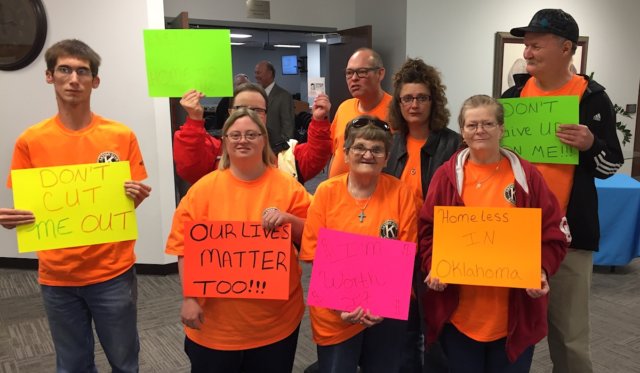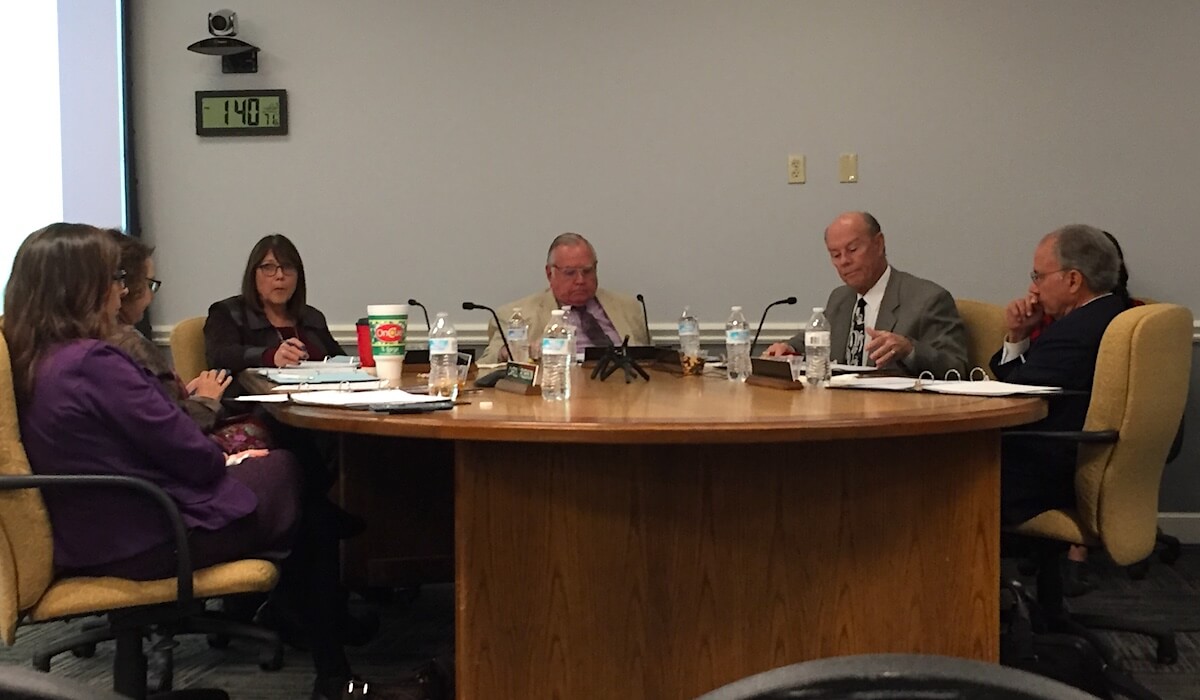

Less than 24 hours after the Oklahoma House of Representatives failed to approve the year’s best chance at a grand revenue bill, the Oklahoma Medicaid agency has approved $34.5 million in reimbursement cuts.
Payment reductions include 4 percent cuts to nursing homes and care facilities for individuals with intellectual disabilities, as well as a 9 percent across-the-board cut for SoonerCare beneficiaries, with some exclusions.
“This board is in a difficult position,” said Oklahoma Health Care Authority board vice chairman Tony Armstrong. “We do not have an opportunity to second-guess the Legislature. I wish we did.”
Wednesday, the Oklahoma House fell five members short of the necessary 76 votes to approve revenue-raising measures. Had HB 1054X passed, the OHCA would have avoided making cuts, staff said. The cuts approved today would take effect Dec. 1 if a funding agreement is not reached by lawmakers.
GOP House leaders remain hopeful that Senate leadership will approve the expenditure of $83 million in carryover funds to fill part of the budget shortfalls facing the OHCA and two other health agencies.
Armstrong said he spoke before Thursday’s meeting with a group of physicians and other health care providers who would be calling House members who voted against Wednesday’s revenue bill.
“This 9 percent cut is telling hospitals, physicians and providers that you are not going to get paid one month’s costs,” Armstrong said. “It is going to impact everything and everyone in Oklahoma. This is not just health care. This is the totality of the operations in the state of Oklahoma, and it will be felt everywhere. If you have not called your legislators, please do so.”

9, 2017. (William W. Savage III)
‘They are setting all health care providers up to fail’
One of the organizations that will feel the Oklahoma Medicaid cuts is Santa Fe Place in Moore, an intermediate care facility that features 32 beds for people with intellectual disabilities.
“I’m in shock right now,” said Jessica Smith, quality assurance director for Santa Fe Place. “What happens now is we have to find out what services to cut. What services do we quit providing in order to keep the doors open? That’s where it’s difficult because the state tells us what services we have to provide. So if they’re going to cut our funding, they need to cut their regulations to match it. Otherwise they are setting all health care providers up to fail.”
Smith said she had followed Armstrong’s advice and contacted her legislators, Sen. Anthony Sykes (R-Moore) and Rep. Mark McBride (R-Moore), but had not heard back.
Both lawmakers voted against the bipartisan revenue package.
In his office Thursday afternoon following the OHCA board meeting, McBride found Smith’s call logged on Nov. 7 among a stack of messages taken by his legislative assistant, whose phone has been bombarded with calls all week.
“It’s hard to get to everything,” McBride said. “I’ve emailed everybody who has emailed me today about my ‘No’ vote (yesterday). I’ve had a lot of people who disagreed with me on my vote, but they were thankful I responded.”
McBride criticized the Senate for not hearing another bill passed by the House that would appropriate carryover money to OHCA, and he critiqued Gov. Mary Fallin for wanting a major tax raise when existing moneys could have been directed to agencies in the first week of special session.
“The story is about a governor and her finance director who have created these fear tactics that are horrible,” McBride said. “We could have dealt with this problem day one, but here we are seven weeks later.
“As far as the House of Representatives is concerned, we have sent legislation, we have sent revenue-raising measures to the Senate and we have more that will come. They gaveled in and adjourned at 9 a.m. today with revenue measures sitting on the table.”
McBride said he believes OHCA and other agencies will have money to fill their budgets by Dec. 1, although he questioned financial management of agencies such as the Oklahoma State Department of Health, which is reeling amid recently disclosed financial problems.
After being alerted to Santa Fe Place’s situation and prior to the publication of this story, McBride said he called Smith and spoke with her about potential solutions and concerns about the OHCA.

‘Someone to run out and buy them a coat for winter’
After the Oklahoma Medicaid agency’s board meeting Thursday, Smith had said she questions agencies’ financial decisions, too.
“My request would be, ‘Don’t cut everybody at once,'” Smith said. “I want to know where they expect these people to live.”
She asked how “carryover” money could exist when the Health Care Authority threatened to cut her facility’s reimbursements last year, and she said she is frustrated by both the agency and the Legislature.
“They’ve got to understand that there’s a crisis at hand,” Smith said. “Something has to be pushed through. I don’t care what it is. I think a lot of people feel like that. I think that’s where most people in health care stand.”
She expressed fear for residents of Santa Fe Place, which is the only intermediate care facility for those with intellectual disabilities in Cleveland County. Smith said McClain County and Pottawatomie County do not have such a facility.
“Our youngest resident currently is 19 years old. Our oldest is 69. We teach them how to be independent. We teach them how to clean their own rooms, cook their own meals, take their own medication,” Smith said. “The hardest part for me is that a lot of them are under-appreciated. They have been abandoned by their families. A lot of them do not have the support system a lot of people would have. They do not have someone to run out and buy them a coat for winter, so that falls on the facility, which just got cut.”
Without Dec. 1 solution: ‘There will be some closures’
Smith and her residents were not the only people to speak at Thursday’s board meeting. Brett Coble, who operates a nursing home in Waurika, discussed the impact of a 4 percent cut to nursing homes.
“I think it’s fair to say there will be some closures. I think it’s hard to say how many and how soon,” Coble said. “In western and southwestern Oklahoma, people will have to travel a great distance to receive care and visit their loved ones.”
Former director of the Oklahoma Temporary High Risk Pool Tanya Case was the only OHCA board member to vote against the intellectual disability home cuts.
“These nursing homes are economic engines in their communities,” Case said. “Typically, when these nursing homes close, usually what happens is the pharmacy closes.”
Exemptions to across-the-board cut
The OHCA’s agenda listed exclusions to the 9 percent across-the-board reduction:
An across-the-board rate reduction in the amount of 9% to SoonerCare providers. The proposed reduction excludes complex rehabilitation technology provider services, long-term care facilities, child abuse exams, non-emergency transportation, Insure Oklahoma, payments for drug ingredients, physician supplied drugs, services provided under a waiver, services paid for by other state agencies, services provided to Native Americans through Indian Health Services Indian/Tribal/Urban (ITU) Clinics, and private duty nursing, emergency transportation, FQHCs/RHCs, Choice Care Coordination, and Programs of All-inclusive Care for the Elderly (PACE).
The Oklahoma Health Care Authority operates the Oklahoma Medicaid program, which is funded based on federal matches for state funding. The OHCA was one of three agencies primarily affected by the Oklahoma Supreme Court’s ruling that a “cigarette fee” passed by the Legislature in May was unconstitutional.
(Correction: This story was updated at 5:20 p.m. to correct reference to Tanya Case’s votes.)




















